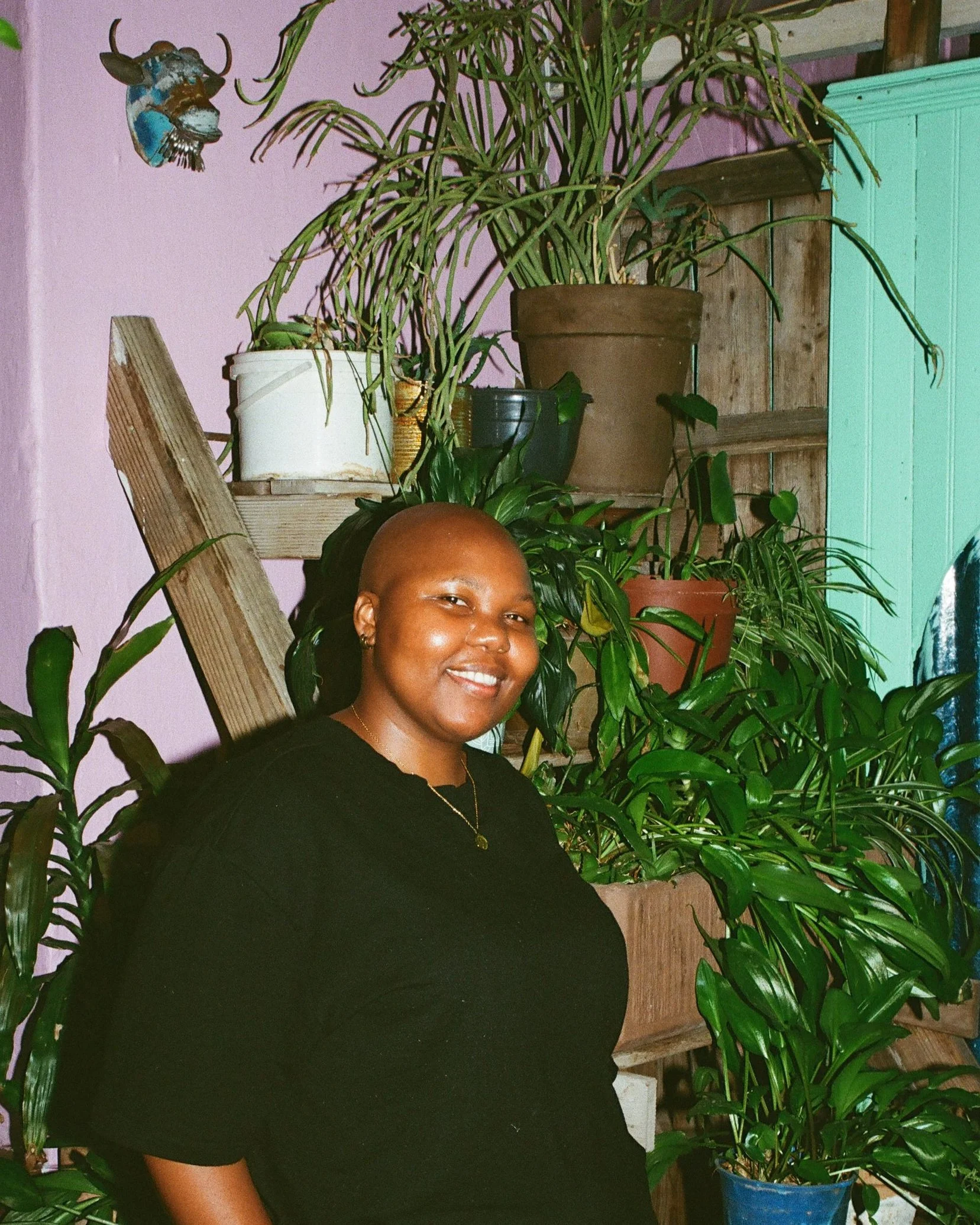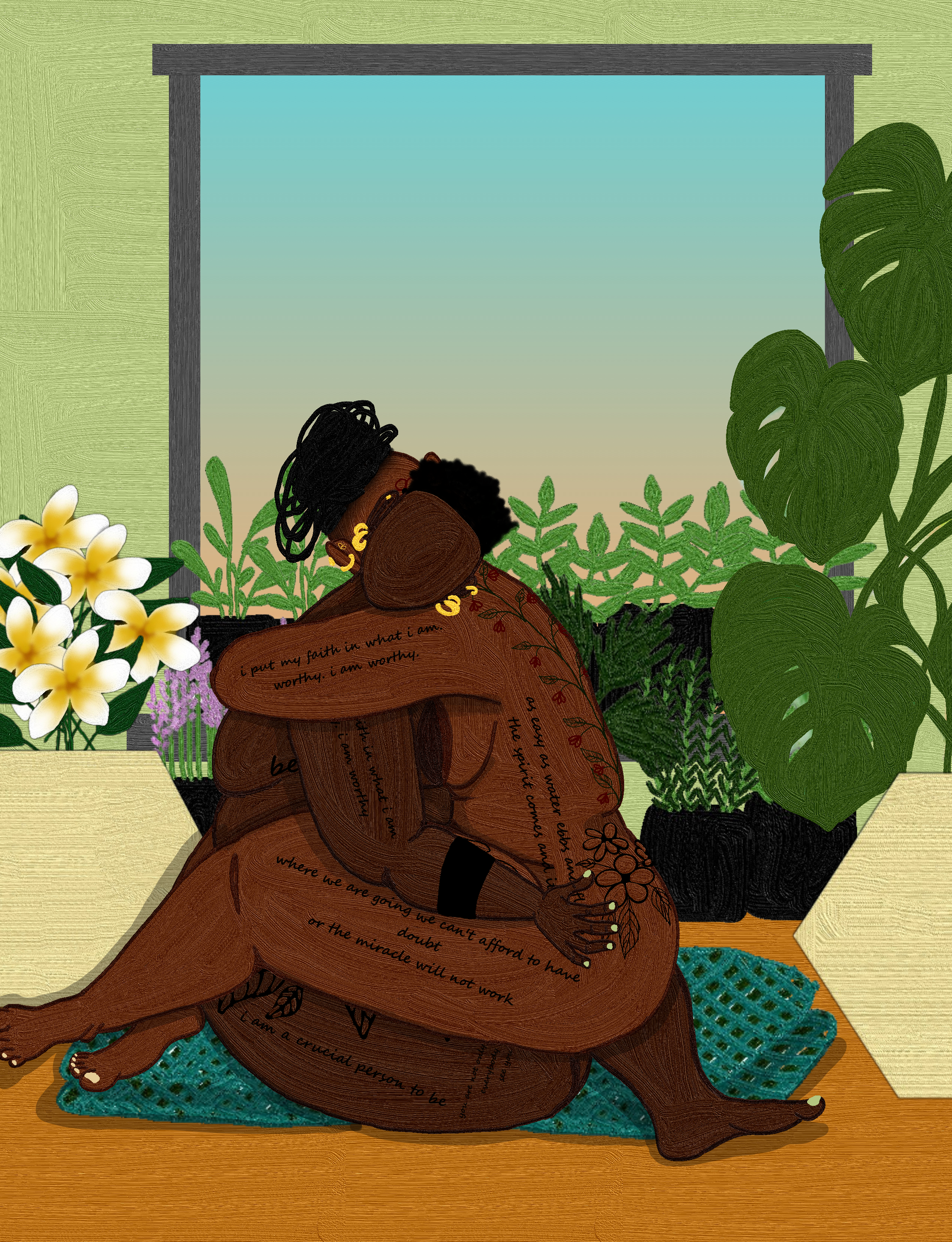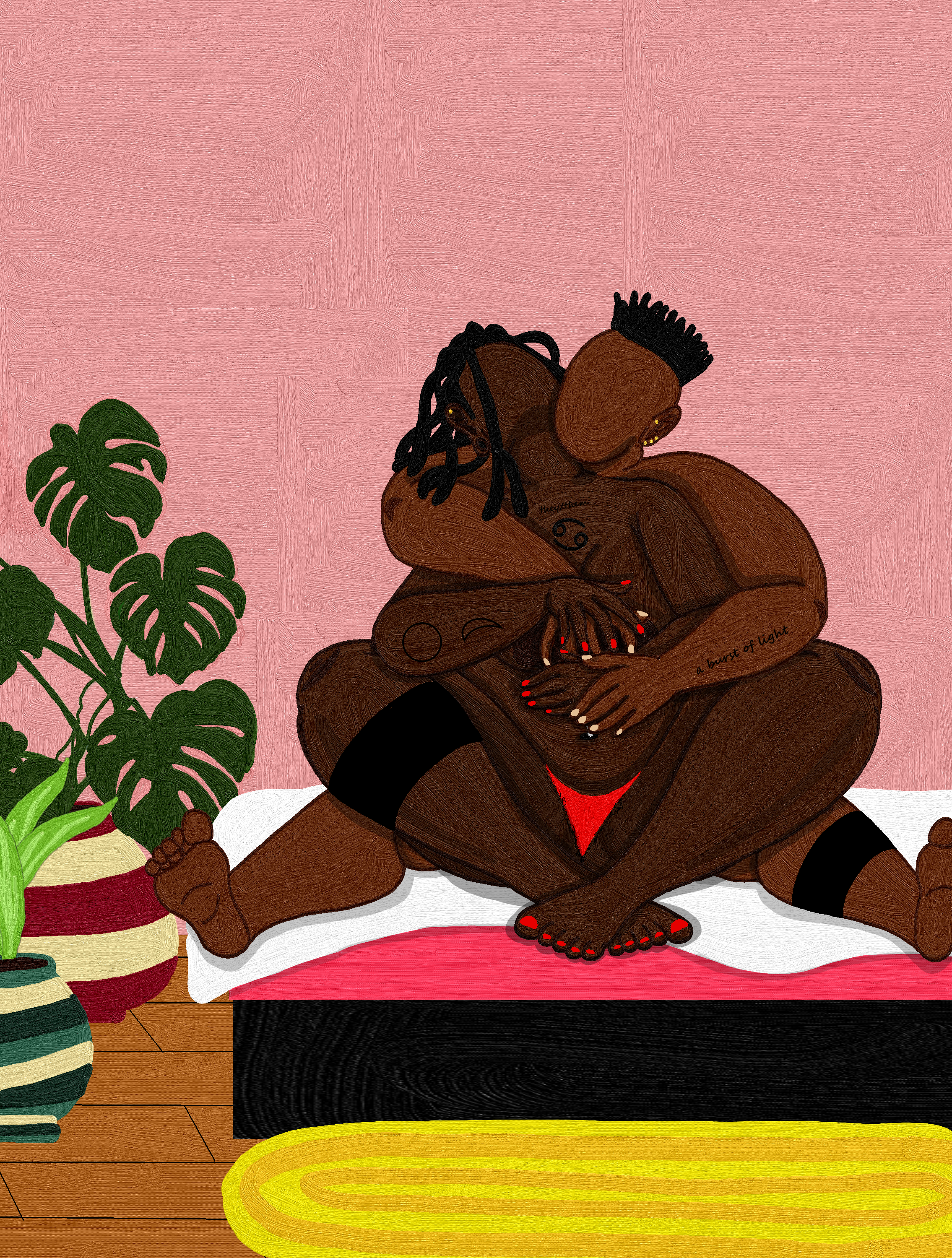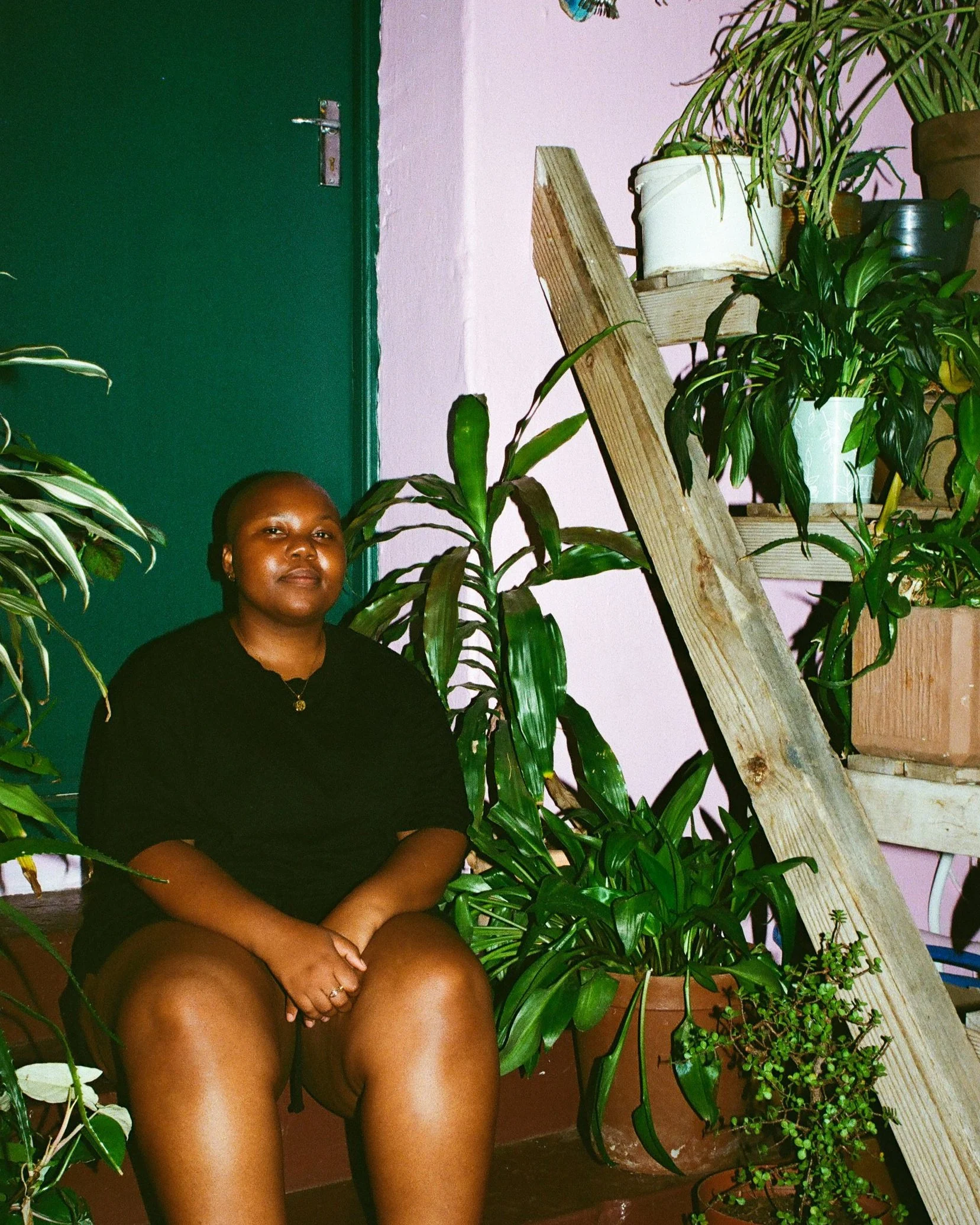Mercy Thokozane Minah, Culture Worker
Mercy Thokozane Mina // captured by Vuyo Polson.
We meet people in our lives everyday. That brief interaction in the line while shopping, the awkward greeting of an old friend, or even the brief eye contact you make passing someone in the street. Most of the people we meet we meet once, others again, and again until they become a main stay. It’s a bit less common to meet someone and realise the impact they’ll have on your life. For me, Mercy was one of those rare but treasured encounters.
I met Mercy for the first time in November of 2024. We were watching one of their friends get destroyed at chess towards the end of a Jazz event. Oddly enough, while talking to them, I felt reassured that in front of me was a gentle soul. At the same time, I felt inspired to dive deeper. After sitting down to chat with Mercy, it became so clear why.
Mercy // captured by Vuyo Polson.
Within the art space, you’re known for your visual art and writing. For the uninitiated, who is Mercy Thokozane Minah?
My bio for the last couple of years has been, 'Mercy is a queer, nonbinary, multidisciplinary maker.' So, I make. If I enjoy it and it stimulates my creativity, I'm going to make it. That's my thing.
I grew up in Johannesburg, in the inner city at first. My family moved around a lot to different flats in Hillbrow, Yeoville, Berea. I was in a lot of different schools growing up. We did the rounds. It was interesting because it became so normal in my formative childhood to make very close friendships and lose them because often I’d be the one to leave. I think that informed how much time I dedicated to being creative. The only outlet I had to fully express myself was creatively, also because I grew up in a very strict Christian household. I performed at church when I was very young -- singing and acting on stage. In primary school I realised I could also draw and write stories. When we had homework to write about our weekends, I was the only kid who added illustrations that weren’t stick people. I was lucky to have teachers and people at church who encouraged me to create. Throughout all the moving around, creativity was a constant that kept me grounded.
How did your family view your creativity?
After high school, my mom told me that art wasn't a serious job and that I must do something serious. So, I went to law school at Wits. I wanted to be a human rights lawyer, but I hated it. I hated how they taught us in law school. There was nothing about it that stimulated creativity, so I failed out badly. While I was studying law I was also becoming an activist, and that's what I poured most of my time into. I was reconciling with the fact that I was queer and how I didn't know a lot about my context as a queer person in South Africa. I remember googling 'famous South African lesbians', and almost every page that came back was about lesbians that had been murdered for their sexuality. And I was like 'what is this?' I grew up in a home where my sexuality was never going to be accepted. All of that galvanised me to become an activist. Through activism, I began re-exploring my art. I got short stories published, the first of which was in an anthology called Queer Africa.
It won a Lambda award, but I couldn’t share that news with anyone because I was closeted. I shared a lot of my writing in a number of other anthologies and blog sites. Until I ended up getting outed by a family friend. They discovered work of mine online and told my mother.
Take it easy - Digital Print by Mercy, 2023.
Your family sounds like they were very conservative back then, what happened when they found out about your identity?
So, for a year after that around 2016, I went through conversion therapy. A psychologist told me they could help me work through my trauma until I was 'healed enough' to be straight. I was also going through conversion therapy at church, where I would get prayed over and certain sermons were held about me. It happened at home as well, where my mom would closely monitor my clothes, hair, mannerisms. It was... yeah.
After a year of conversion therapy, I left home, lived in Thembisa for a while, and then I moved to Cape Town. That entire year I was essentially free, but I was so traumatised that all I did was work and drink. I didn't address any of the things I'd gone through. The following year I was in bed for most of the year with a really debilitating combination of PTSD, depression and anxiety.
One of the conditions of me going back home was for my mom to accept my identity, which she tried her best to do. I went to a psychiatrist and got diagnosed. I got the help I needed. While I was coming back into myself, I made the decision to commit myself to being an artist. That was the clearest calling I had. Everything else about myself was out in the open, so I decided to live fully for myself by being an artist. I applied to go back to Wits, and studied theatre and performance there, aged 27. It was when I realised: nothing in my life had been in vain. Being repressed and censored forced me to build a lot of confidence.
Would you say your experience with your family is part of why your work speaks so much on identity? What is your artist's statement and to what extent does your identity form a part of it?
I want to conceptualise the relationship between intimacy and freedom, in the sense that I explore what intimacy could look like if queer people were completely free-- in very tangible and practical ways
It's interesting becoming an activist in your formative years, in terms of your identity coming into being. My foundation caused my values to be centred towards urgent global liberation, it was always really important to me. I realised that the digital images of queer imagery that I had been creating, which were about healing and catharsis to myself, were already radical in the sense that I was depicting black, queer, plus size people in realities where they were completely safe. Joyful, loved and loving. Initially it was like I was pulling from my own memories of intimacy with partners or witnessing those relationships in my community. the more I created, the more I realised there was a chasm between what I was creating and the actual lived reality of queer people globally. Even though we exist and love in spite, there were many instances of violence that would happen within our communities, which I experienced as well. While healing from those specific traumas, I questioned what the sociological context was behind that, because if we're a community coming together, we're seeking safety from one another-- but then where is the safety? It's not there, why?
Close to you - Digital Print by Mercy, [2023].
I started realising the absence of safety was directly related to the absence of freedom. And freedom, not in an abstract way, but freedom in the sense that you have all your basic needs met: shelter, healthcare, food, water, sanitation, community. Increasingly, queer people don't have access to these. The more communities I found myself in, the more I realised most queer people don't have their basic needs met. We can't give each other safety when we're in survival mode. Hence why I explore what intimacy could look like, if queer people were completely free in very practical, tangible ways.
What do you see as the role of culture in leading that shift towards freedom of intimacy? Your work, for example, already serves as an awakening for countless queer people. How does that drive you?
Part of why I create and share my work the way I do, is because I want to engage in what I call 'possibility modelling'. Possibilities of freedom and safety. But also, modelling a way of existing while being a particular identity. People that are marginalised need to know that they are possible. It's presenting people with the reality of who they are and who they can be. If more people are aware of a different reality, they might just fight for it. Colonialism and capitalism are young ideas in the context of the very young species that is humanity, and knowing that gives me optimism that we won't always be living with these systems. Alternatives can and will exist.
For the longest time, I didn't think my work was political because it was so happy and soft and warm. Until I started taking note of the amount of resistance I experienced when creating my work. The other day, someone was leaving hateful comments in my Instagram, y'know, people damning you to hell. I've gotten those so consistently while creating. And it's like, I wouldn't experience this level of resistance to the work I'm creating if it wasn't a threat to the status quo. I'm understanding the innate politicism in the work, just by documenting that people like this exist. Seeing that tangible effect, I'm driven to be a lot more explicit and direct with the advocacy through my work I create.
Do you have a favourite artwork that you've created, one that you're most proud of, something that will always have a soft spot in your heart? Or do you maybe not look back on your creations?
My art is like my children, I have close to 500 children. Those are my babies. There's definitely a piece I really enjoyed making and ended up turning into my logo.
I remember when I was making it, I was making it from an excerpt of a poem by Audrey Lorde,
"Attend me. Hold me in your muscular, flowering arms. Protect me from throwing any parts of myself away."
There was something about the inspiration of the piece being that text, and the creation and meaning behind it. It's just a piece where two lovers are sitting on a bed, one holding the other from behind. I wanted to create a piece that communicates how intimacy can keep you intact as a marginalised person. There are ways that your lover can look at you, hold you, be with you, that make you feel that all of who you are can be in the same space at the same time.
Hold me in your muscular flowering arms - Digital Print by Mercy, 2023.
That piece was so special that there was this person in Brazil that contacted me saying that they'd like to pay me to have a tattoo artist in Brazil turn this into one of their tattoos. It was insane. I've had work permanently marked on someone's skin, which is still one of the most mind-blowing experiences I've had from these illustrations that I do.
So definitely, ‘hold me in your muscular flowering arms.’
That's mind blowing. It makes me wonder how you reconcile the two halves: on one hand, adoration for your work; on the other, negativity and censorship. How do you view the art industry and the space it does, or doesn't allow, for queer creatives. What is your message for the industry as a whole?
I see the industry as a very arbitrary, cowardly and bigoted space. The people determining what moves, what doesn't, what’s valid and what it isn't-- they're usually non creative people with lots of money. The industry feels like it's constantly in conversation with people who shouldn’t have that much of a say, because they don't care about art in the way that they should.
What I would say to the art industry as a whole is that creativity isn’t just about creating pretty images that sell, it's also about honouring culture. Artists are not factories; we don't create products. we're culture workers. I think the industry doesn't respect that, it's constantly looking at popularity, hype, capital. The mere fact that it's called an industry -- it functions like one, in a very capitalistic way. The value of art depends on capital, instead of culture and the contribution of the work to the culture. Anybody who contributes to their culture is invaluable. Maybe the industry needs to reorient its understanding of why art is and what it is. I don't say this from a place of bitterness, I say this from a place of understanding what art is supposed to do, because I’ve lived it.
If someone tells me, 'I want your work in my home because it represents who me and my lover are,' I shouldn't be told to place less value on that because they aren't a collector or a wealthy buyer. How do you place a value on something like that, how do you deny the value in that?
Mercy // captured by Vuyo Polson
Knowing everything that you do, what would you define as a creative and what do you hope for creative people exploring their craft?
Definitions are weird because they don’t serve the defined, they serve the definer. I would say a creative is someone who is tapped into their creativity and engages it with respect, reverence, discipline and commitment. My hope for everyone that lives and engages their creativity that way, is that they're able to do that without compromising themselves. Without losing sight of their why. And with enough resources to be able to sustain that relationship throughout their lives.
Culture work and creativity have been the longest jobs in existence. Creatives throughout history have been trying to tap into the same source that calls you to honour a particular instinct specific to creativity. To community. To having reverence for yourself and the collective.
If you could say something to young creatives, to younger Mercy, who perhaps didn't see a way forward, what piece of advice do you have for them and your younger self?
It does not matter who says what, who sees what, who acknowledges, affirms, seeks out, validates, values you or your art. You know who you are. And your biggest brightest ideas let you know exactly who you are. So it's very important to develop a relationship with yourself, rooted in respect, compassion, self-possession and inner validation. All of those things will constantly be questioned, challenged, repressed, et cetera. Which is why it's important to develop yourself, that relationship with you and that trust that you know exactly who you are. You always know exactly who you are. Even if someone tells you they think you're too much or that you think you're bigger than you are, that's inaccurate. Nobody knows you the way that you know yourself, and we're all experts on who we are.
A very important part of creativity is authenticity. If you know yourself, your creativity will always be safe.
Mercy // Captured by Vuyo Polson.
When we met at the Word of Mouth’s Anniversary Pop-up towards the end of last year, I immediately knew I wanted to connect to this stranger. It was another one of those special chance moments, and it definitely didn’t disappoint. Mercy has this way of making you feel at ease, and after having the pleasure of chatting with them further, I can see why.
I think Mercy, first and foremost, is a role model. They embody what it means to be a culture worker— unwavering, empathetic and in touch with themselves and their creativity. Without a doubt, this conversation will stick with me for life. I can only optimistically hope that the same is true for those reading. I already know it’s true for all those lucky enough to get to call Mercy their friend. I also know it’s even more true for all those souls that have been saved through their work. Through their medicine.







